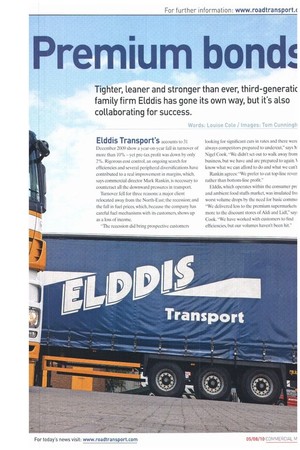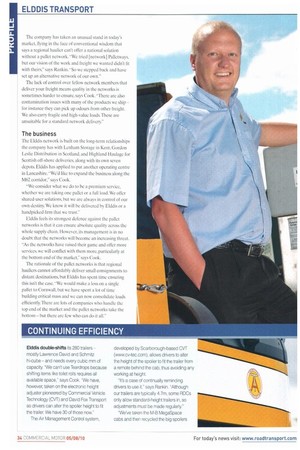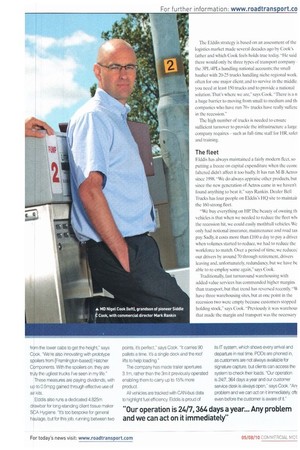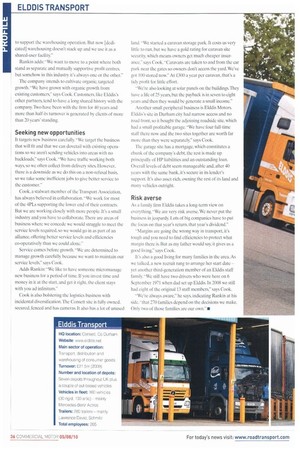Premium bonth
Page 33

Page 34

Page 35

Page 36

If you've noticed an error in this article please click here to report it so we can fix it.
Tighter, leaner and stronger than ever, third-generatic family firm Elddis has gone its own way, but it's also collaborating for success.
Words: Louise Cole / Images: Tom Cunningh Elddis Transport's accounts to 31 December 2009 show a year-on-year fall in turnover of more than 10% — yet pre-tax profit was down by only 2%. Rigorous cost control, an ongoing search for efficiencies and several peripheral diversifications have contributed to a real improvement in margins, which, says commercial director Mark Rankin, is necessary to counteract all the downward pressures in transport.
Turnover fell for three reasons: a major client relocated away from the North-East: the recession; and the fall in fuel prices, which, because the company has careful fuel mechanisms with its customers, shows up as a loss of income.
-The recession did bring prospective customers looking for significant cuts in rates and there were always competitors prepared to undercut:" says 11/ Nigel Cook. "We didn't set out to walk away from business, but we have and are prepared to again. I know what we can afford to do and what we can't Rankin agrees: "We prefer to cut top-fine rever rather than bottom-line profit."
Elddis, which operates within the consumer prc and ambient food stuffs market, was insulated fro worst volume drops by the need for basic commo "We delivered less to the premium supermarkets more to the discount stores of Aldi and Lidl," say! Cook. We have worked with customers to find efficiencies, but our volumes haven't been hit.
The company has taken an unusual stand in today's market, flying in the face of conventional wisdom that says a regional haulier can't offer a national solution without a pallet network. "We tried (network] Pallctways, but our vision of the work and freight we wanted didn't fit with theirs," says Rankin. "So we stepped back and have set up an alternative network of our own."
The lack of control over fellow network members that deliver your freight means quality in the networks is sometimes harder to ensure. says Cook. "There arc also contamination issues with many of the products we ship for instance they can pick up odours from other freight. We also carry fragile and high-value loads. These are unsuitable for a standard network delivery"
The business The Elddis network is built on the long-term relationships the company has with Lenham Storage in Kent. Gordon Leslie Distribution in Scotland, and Highland Haulage for Scottish off-shore deliveries, along with its own seven depots. Elddis has applied to put another operating centre in Lancashire. -We'd like to expand the business along the M62 corridor," says Cook.
"We consider what we do to be a premium service. whether we are taking one pallet or a full load. We offer shared-user solutions, but we are always in control of our own destiny. We know it will be delivered by Elddis or a handpicked firm that we trust."
Elddis feels its strongest defence against the pallet networks is that it can ensure absolute quality across the whole supply chain. However, its management is in no doubt that the networks will become an increasing threat. "As the networks have raised their game and offer more services, we will conflict with them more, particularly at the bottom end of the market," says Cook.
The rationale of the pallet networks is that regional hauliers cannot affordably deliver small consignments to distant destinations, but Elddis has spent time ensuring, this isn't the case. "We would make a loss on a single pallet to Cornwall, but we have spent a lot of time building critical mass and we can now consolidate loads efficiently There are lots of companies who handle the top end of the market and the pallet networks take the bottom but there are few who can do it all."
The Elddis strategy is based on an assessment of the logistics market made several decades ago by Cook's father and which Cook feels holds true today. "He said there would only be three types of transport company the 3PIJ4P1Ls handling national accounts: the small haulier with 20-25 trucks handling niche regional work. often for one major client: and to survive in the middle, you need at least 150 trucks and to provide a national solution.' that's where we are," says Cook. "There is a n a huge barrier to moving from small to medium and th+ companies who have run 70+ trucks have really suffere in the recession:
The high number of trucks is needed to ensure sufficient turnover to provide the infrastructure a large company requires—such as full-time staff for HR. safel and training.
The fleet Elddis has always maintained a fairly modern fleet, so putting a freeze on capital expenditure when the econc faltered didn't affect it too badly. It has run M-B Actrm since 1998. "We do always appraise other products, hut since the new generation of Actros came in we haven't found anything to beat it." says Rankin. Dealer Bell Trucks has four people on Elddis's HQ site to main Lair the 160-strong fleet "We buy everything on HP.The beauty of owning th vehicles is that when we needed to reduce the fleet wN the recession hit. we could easily mothball vehicles. We only had notional insurance, maintenance and road tax pay. Sadly, it costs more than £100 a day to pay a driver when volumes started to reduce, we had to reduce the workforce to match. Over a period of time, we reduced our drivers by around 70 through retirement, drivers leaving and, unfortunately, redundancy. but we have he able to re-employ some again," says Cook.
Traditionally, fast turnaround warehousing with added-value services has commanded higher margins than transport, but that trend has reversed recently. "\ have three warehousing sites, hut at one point in the recession two were empty because customers stopped holding stock," says Cook. 'Previously it was warehow that made the margin and transport was the necessary to support the warehousing operation. But now [dedicated warehousing doesn't stack up and we use it as a shared-user facility."
Rankin adds: "We want to move to a point where both stand as separate and mutually supportive profit centres. but somehow in this industry it's always one or the other."
The company intends to cultivate organic, targeted growth. "We have grown with organic growth from existing customers," says Cook. Customers, like Elddis's other partners, tend to have a long shared history with the company Two have been with the firm for 40 years and more than half its turnover is generated by clients of more than 20 years' standing.
Seeking new opportunities
It targets new business carefully. "We target the business that will fit and that we can dovetail with existing operations so we aren't sending vehicles into areas with no backloads," says Cook. "We have traffic working both ways, so we often collect from delivery sites However, there is a downside as we do this on a non-refusal basis, so we take some inefficient jobs to give better service to the customer."
Cook, a stalwart member of the Transport Association, has always believed in collaboration. "We work for most of the 4PLs supporting the lower end of their contracts But we are working closely with more people. It's a small industry and you have to collaborate. There are areas of business where we concede we would struggle to meet the service levels required, so we would go in as part of an alliance, offering better service levels and efficiencies co-operatively than we could alone:' Service comes before growth. "We are determined to manage growth carefully because we want to maintain our service levels," says Cook.
Adds Rankin:"We like to have someone micromanage new business for a period of time. If you invest time and money in it at the start, and get it right, the client stays with you ad infinitum."
Cook is also bolstering the logistics business with incidental diversification. The Consett site is fully owned, secured, fenced and has cameras. It also has a lot of unused
land. "We started a caravan storage park. It costs us very little to run, but we have a gold rating for caravan site security, which means owners get much cheaper insurance," says Cook. "Caravans are taken to and from the car park near the gates so owners don't access the yard. We've got 100 stored now." At I:300 a year per caravan, that's a tidy profit for little effort.
"We're also looking at solar panels on the buildings They have a life of 25 years, but the payback is in seven to eight years and then they would be generate a small income:'
Another small peripheral business is Elddis Motors Elddis's site in Durham city had narrow access and no road front, so it bought the adjoining roadside site. which had a small profitable garage. We have four full-time staff there now and the two sites together are worth far more than they were separately." says Cook.
The garage site has a mortgage, which constitutes a chunk of the company's debt, the rest is made up principally of HP liabilities and an outstanding loan. Overall levels of debt seem manageable and, after 40 years with the same bank, it's secure in its lender's support. It's also asset-rich, owning the rest of its land and many vehicles outright.
Risk averse
As a family firm Elddis takes a long-term view on everything. "We are very risk averse. We never put the business in jeopardy. Lots of big companies have to put the focus on that year's return, that year's dividend."
"Margins are going the wrong way in transport, it's tough and you need to find efficiencies to protect what margin there is. But as my father would say. it gives us a good living," says Cook.
It's also a good living for many families in the area. As we talked, a new recruit rang to arrange her start date — yet another third-generation member of an Elddis staff family. "We still have two drivers who were here on 6 September 1971 when dad set up Elddis. In 2008 we still had eight of the original 13 staff members," says Cook.
"We're always aware," he says, indicating Rankin at his side, "that 270 families depend on the decisions we make. Only two of those families are our own." •
























































































































